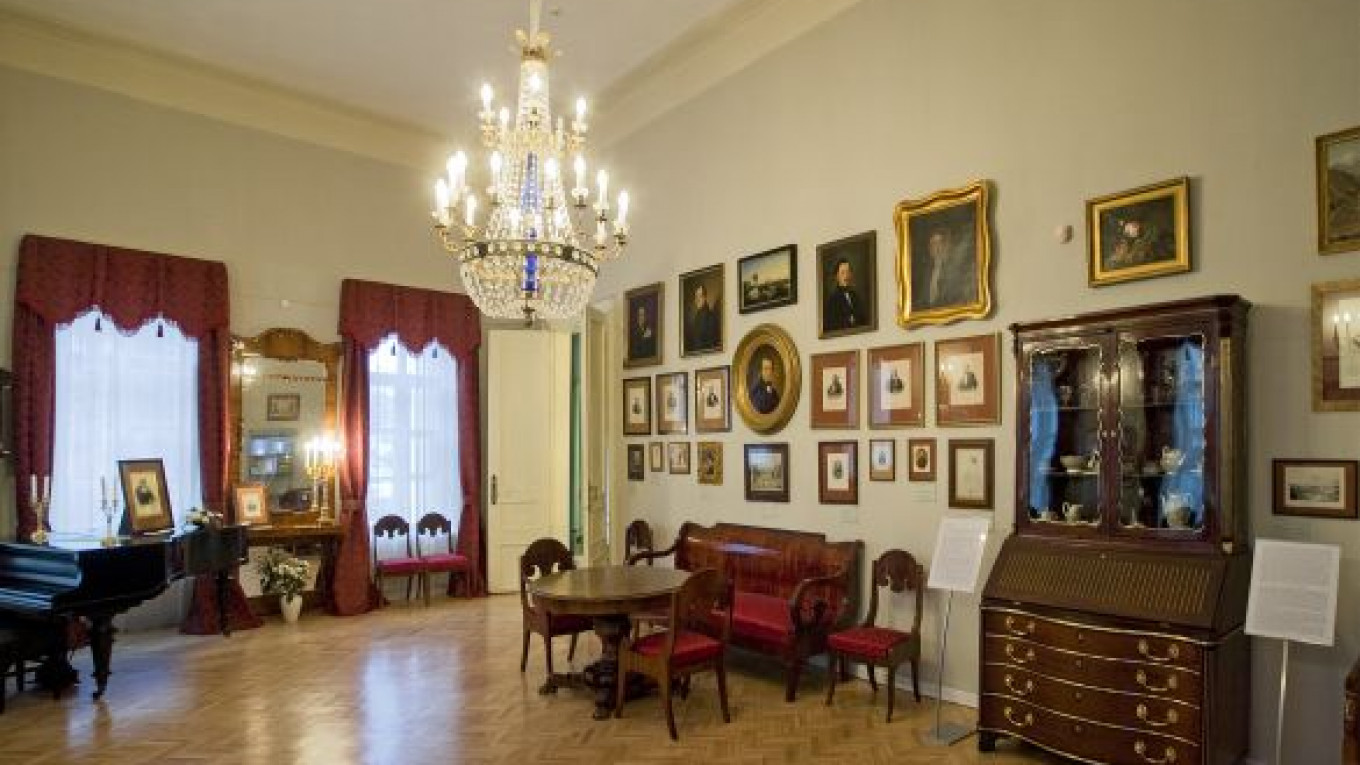Fans of one of Russia’s most famous writers, Ivan Turgenev, can finally visit a museum in Moscow dedicated to the author of “Fathers and Sons” and “Notes of a Hunter.”
The museum at 37 Ulitsa Ostozhenka is in a small 19th-century building once described by Turgenev in the opening lines of his famous story, “Mumu,” about a cruel mistress who forces her mute servant to drown his beloved dog, Mumu.
“In one of the outlying streets of Moscow, in a gray house with white columns and a balcony, warped all askew, there was once living a lady, a widow, surrounded by a numerous household of serfs. … Her day, a joyless and gloomy day, had long been over; but the evening of her life was blacker than night,” the story begins.
That nasty mistress was based on Turgenev’s mother, Varvara, who lived in the house from 1840 until her death in 1850. Turgenev visited his mother on numerous occasions, and the house later became known as the “house of Mumu.” His mother even had a mute servant, Andrei, just like the long-suffering Gerasim in the story.
Fans have been trying to open a museum at the house for more than half a century and finally succeeded last month. The house became part of a series of communal flats during the 20th century and was used until recently by a company that made sports goods.
After the company’s lease ended, the building was turned over to the Pushkin Museum, which set up the new museum to much acclaim.
“People haven’t stopped visiting the museum. Some of them bring flowers. Muscovites were waiting for this museum,” said Yelena Gribkova, a curator at the museum.
The museum is filled with items borrowed from other Turgenev museums. The original carpet is now in place, as is a photo album and casket owned by Turgenev’s mother and first editions of the author’s writings.
“These are the real things of the Turgenevs,” Gribkova said.
One of the museum’s most prized possessions is a signed letter from Turgenev.
“We managed to get the autograph only through a miracle,” Yelena Potyomina, deputy director of the Pushkin Museum, told local media. “When it appeared for sale, we decided at our own risk to buy it. And only after an expert examination was made was it proven that it is the genuine signature of Ivan Sergeyevich Turgenev.”
Other items include the last portrait of the writer and his death mask.
The museum is only partly open, as the building is set to be fully restored over the next few years.
When it is opened fully, Gribkova said the museum hopes to have family evenings that will bring together Turgenev’s descendants.
Before the opening, there were only two museums dedicated to Turgenev in Russia and, surprisingly, none in Moscow or St. Petersburg. There is a museum in the country estate where Turgenev grew up in the Oryol region and another small museum in the city of Oryol.
There is also a museum in the home where Turgenev lived for much of his life in Bougival, France.
However, that museum is currently under threat from property developers, according to an appeal published earlier this month on the museum’s web site, Tourgueniev.fr.
The museum on Ulitsa Ostozhenka celebrated the 191st anniversary of Turgenev’s birth on Nov. 9, when it was given a number of pieces, including a photograph of Pauline Viardot, the woman believed to be the love of Turgenev’s life.
Turgenev Museum, 37 Ulitsa Ostozhenka. Metro Park Kultury. Open on Wed., Thurs. and Fri. from 10 a.m. to 6 p.m. Tel. 695-1078.
A Message from The Moscow Times:
Dear readers,
We are facing unprecedented challenges. Russia's Prosecutor General's Office has designated The Moscow Times as an "undesirable" organization, criminalizing our work and putting our staff at risk of prosecution. This follows our earlier unjust labeling as a "foreign agent."
These actions are direct attempts to silence independent journalism in Russia. The authorities claim our work "discredits the decisions of the Russian leadership." We see things differently: we strive to provide accurate, unbiased reporting on Russia.
We, the journalists of The Moscow Times, refuse to be silenced. But to continue our work, we need your help.
Your support, no matter how small, makes a world of difference. If you can, please support us monthly starting from just $2. It's quick to set up, and every contribution makes a significant impact.
By supporting The Moscow Times, you're defending open, independent journalism in the face of repression. Thank you for standing with us.
Remind me later.


